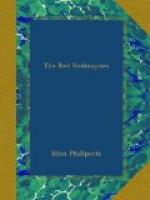“You throw up the sponge, signor?” asked Giuseppe in astonishment.
“Surely you have caught everybody you ever tried to catch, Peter?” asked Albert.
“There is a reason why I shall not catch him,” replied Ganns, sipping from his little Venetian glass.
“Can it be that you think him not a man at all but a ghost, Mr. Ganns?” asked Jenny, round-eyed.
“He has already suggested a ghost,” said Mark, “but there are different sorts of ghosts, Mrs. Doria. I see that, too. There are ghosts of flesh and blood.”
“If he is a ghost, he is a very solid one indeed,” declared Doria.
“He is,” admitted Peter. “And yet none the less a ghost in my opinion. Now let us generalize. It needn’t be a sound maxim to seek the person who benefits by a crime—not always—for often enough the actual legatee of a murdered man may have had nothing whatever to do with his death. Albert, for example, will inherit Mr. Bendigo Redmayne’s estate when leave to assume his death is granted by the law; and Mrs. Doria will inherit her late husband’s estate in due course. But it isn’t suggested that your wife killed her first husband, Signor Doria; and it isn’t suggested that my friend here killed his brother.
“None the less, it’s a safe question to ask what a suspected man gains by his crime. And, if we put that question, we find that Robert Redmayne gained nothing whatever by killing Michael Pendean—nothing, that is, but the satisfaction of a sudden, overpowering lust to do so. Pendean’s murder made Redmayne a vagabond, deprived him of his income and resources, set every man’s hand against him and left him a wanderer haunted by the gallows. Yet, while he evaded the law in a manner that can only be called miraculous, he made no attempt to avert suspicion from himself. On the contrary he courted suspicion, took his victim to Berry Head on a motor bicycle and did a thousand things which defiantly proclaim him a lunatic—but for one overmastering fact. A lunatic must have been caught: he was not.
“He vanishes from Paignton, to reappear at ‘Crow’s Nest’; he takes another life; he apparently commits another senseless murder on the person of his own brother and once more disappears, leaving not a clue. Now, in face of these absurdities, we have a right to brush aside the apparent facts and ask ourselves a very vital question. What is that question, Signor Doria?”
“It is one I have already asked myself,” replied Giuseppe. “It is one I have asked my wife. It is a question, however, which I cannot answer, because I do not know enough. There is nobody in the world who knows enough—unless it be Robert Redmayne.”
Ganns nodded and took snuff.
“Good,” he said.
“But what is the question?” asked Albert Redmayne. “What is the question Giuseppe puts to himself and, you put to yourself, Peter? We who are not so clever do not see the question.”




